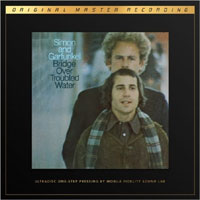Simon & Garfunkel • Bridge Over Troubled Water
 t’s
not hard to understand why Mobile Fidelity chose Bridge Over Trouble Water as its
fourth entry in the Ultradisc One-Step program. In addition to being the best-selling
album three years straight beginning in 1970, and CBS Records’ best-selling album of
all time until Michael Jackson’s Thriller, it’s widely acknowledged to be
among the best-recorded pop albums ever. It was Simon & Garfunkel’s fifth and
final album together, before they split up. Garfunkel took a role in the movie Carnal
Knowledge, and it was the pinnacle of his acting career. Simon entered into an
intensive study of music and parlayed that into one of the most successful solo careers in
pop-music history. t’s
not hard to understand why Mobile Fidelity chose Bridge Over Trouble Water as its
fourth entry in the Ultradisc One-Step program. In addition to being the best-selling
album three years straight beginning in 1970, and CBS Records’ best-selling album of
all time until Michael Jackson’s Thriller, it’s widely acknowledged to be
among the best-recorded pop albums ever. It was Simon & Garfunkel’s fifth and
final album together, before they split up. Garfunkel took a role in the movie Carnal
Knowledge, and it was the pinnacle of his acting career. Simon entered into an
intensive study of music and parlayed that into one of the most successful solo careers in
pop-music history.
Before they went their separate ways, however, Simon & Garfunkel cut eleven tracks for this album. While the last three numbers strike me as filler, the first eight are unparalleled. The backing musicians are all members of the Wrecking Crew, a loose group of Los Angeles-based studio musicians who supplied backing music for some of the greatest pop hits of the era. The title song owes a great debt to Simon’s absorption of the Beatles, the Righteous Brothers and the gospel music of Claude Jeter of the Swan Silvertones. Other songs mix in the influences of the Everly Brothers, Andean music, The Beach Boys and jazz. Nineteen seventy saw the release of dozens of albums now considered among the classics of rock and pop: John Lennon’s Plastic Ono Band, Led Zeppelin’s III, Neil Young’s After The Gold Rush, and Van Morrison’s Moondance. Even if you prefer some of the year’s edgier material, like The Stooges' Fun House or Black Sabbath’s Paranoid, there’s still no denying that Bridge Over Troubled Water ranks high on any list of the best pop albums of 1970 -- or any other year. Mobile Fidelity's One-Step process claims to reveal more musical detail by removing two steps in the plating process. In the standard process, a father and mother are created as intermediate steps, resulting in two extra stages of detail loss. In the One-Step process, the first step is to create a lacquer (a positive impression) and then a Convert (a negative) that is formed into the stamper from which the vinyl records are pressed. This One-Step process is far more fragile and takes much more time. New records in the series thus take much longer to produce, and some titles, like The Bill Evans Trio: Sunday at the Village Vanguard [Mobile Fidelity UD1S 2-002], are created in such small editions (3000 for Sunday at the Village Vanguard) that they sell out before the first record is shipped. Like all Ultradisc One-Step releases, Bridge Over Troubled Water is a set of two 180-gram 45rpm LPs, each disc enclosed in its own sleeve, and the two sleeved discs are enclosed in a box containing a reproduction of the original front and back artwork and graphics. A full color photograph by Don Hunstein is another insert along with a sheet describing the One-Step process. Lacquers were cut using the original master tapes, with mastering by Krieg Wunderlich, Shawn Britton assisting. Each box is individually numbered. Bridge Over Troubled Water was authorized for 7500 units, but unfortunately it is already sold out. A decent original of Bridge Over Troubled Water (a red two-eyed Columbia label with reasonably low stamper numbers) is not terribly expensive. For twenty bucks, you can probably own one, although you might endure a couple of noisy copies before you find one that plays through without too many ticks and pops. Is the $99 One-Step release worth the extra money? Oh, yes. Big time. The increase in detail is particularly significant because of the type of recording involved. Lots of layers of music were integrated by recording engineer Roy Halee, and the resulting music always sounded pretty impressive. With this new release, the stage height and depth are significantly improved and there is simply more space into which all that detail fits. The original never sounded muddy, but I relistened to it and compared several cuts, and the rich details of the One-Step make the original sound thick and sludgy by comparison. Dynamics are also improved. When the brass section enters on "Keep The Customer Satisfied," the original gets a tad strident when turned up. Not so with the MoFi. The three-dimensional, layered sound is especially impressive on "So Long, Frank Lloyd Wright." Of the four releases to date in the One-Step program,
this one is the most dramatic demonstration of what the process can achieve. The Bill
Evans release was very, very good, but it was in competition with an already superlative
Acoustics Sounds 45rpm release remastered by Kevin Gray. The improvement achieved on Bridge
Over Troubled Water is singular. Even if you think that the greatest thing happening
in high-end audio these days is to be able to load a million songs on your computer in
high-res digital so you have access to virtually anything at the press of a button, you
owe it to yourself to discover just how good old-fashioned vinyl has gotten over the last
decade. Quality trumps quantity, and this is as good as it gets. It is going to be very
hard to beat. (That’s a challenge, MoFi.) |
